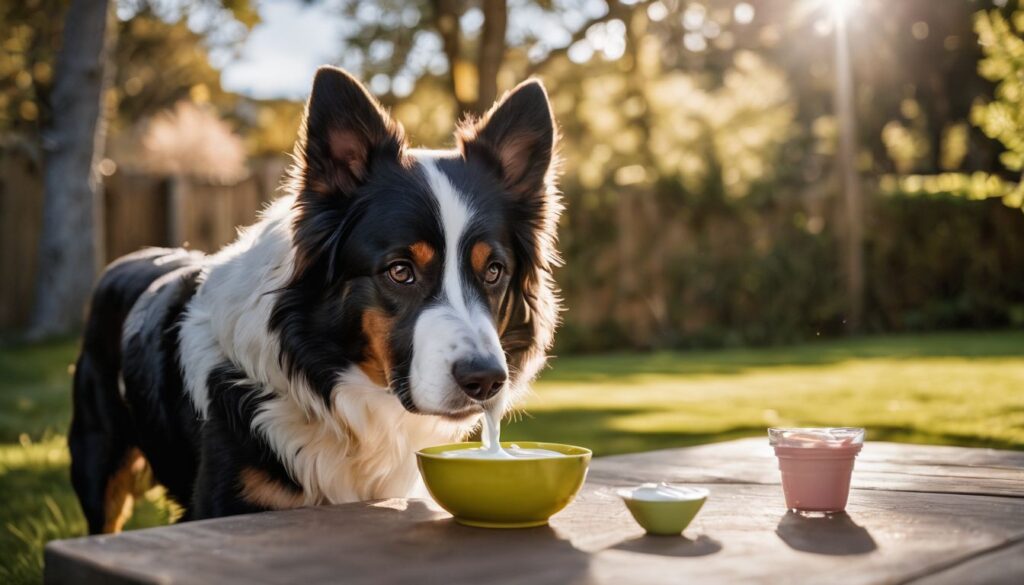Are you wondering if it’s okay to share a bit of your cheese or ice cream with your furry friend? Some dogs may have trouble with dairy, just like people can. Our blog will guide you through the do’s and don’ts of feeding dairy to dogs, helping you understand which products are safe and how to introduce them properly.
Let’s dig in and keep our pups happy and healthy!
Key Takeaways
- Some dogs can’t digest lactose, so dairy can cause them upset stomachs.
- Safe dairy for dogs includes plain yogurt and some cheese in small amounts.
- Always start with little bits of dairy to see how your dog acts to it.
- Milk alternatives like almond milk or lactose-free milk are options but check for bad sweeteners like xylitol.
- Talk to a vet before giving your dog dairy to make sure it’s okay.
Can Dogs Safely Consume Dairy Products?
Dogs can be lactose intolerant, meaning they may have difficulty digesting dairy products. Feeding dairy to dogs can lead to digestive upset and discomfort.
Lactose intolerance in dogs
Lactose intolerance in dogs is like it is in humans. Some dogs can’t digest lactose, which is a sugar found in milk and other dairy products. Their bodies don’t make enough of an enzyme called lactase that breaks down lactose.
If these dogs drink milk or eat dairy, they might get sick to their stomachs. This means they could feel bad with symptoms like gas, diarrhea, or throwing up.
If your dog shows signs of discomfort after eating cheese or having ice cream, it might be due to lactose intolerance. Not all dogs have this problem though; some can enjoy small amounts of dairy without any trouble.
It’s important to watch how your pet reacts to dairy before making it a regular treat. Always talk with a vet if you’re not sure what’s safe for your furry friend’s diet.
Risks of feeding dairy to dogs
Feeding dairy to dogs can pose risks due to lactose intolerance, which is common among canines. Many dogs lack the enzyme needed to break down lactose in milk, leading to digestive issues such as diarrhea, gas, or vomiting.
While some dairy products like cheese and yogurt may be tolerated better by certain dogs, others may still experience adverse reactions. Additionally, milk alternatives for dogs may contain harmful artificial sweeteners like xylitol.
Therefore, it’s crucial for pet owners to be cautious when feeding their dogs dairy products and monitor their individual reactions closely before incorporating these items into their diet.
What Dairy Products Can Dogs Safely Eat?


When it comes to dairy products, some dogs can safely consume certain options. From almond milk to organic milk, there are alternatives available for dogs with lactose intolerance or other sensitivities.
It’s important to know the safe options and how to incorporate them into a dog’s diet effectively.
Milk alternatives for dogs
Some lactose intolerant dogs may handle almond milk or organic lactose-free milk.
- Almond milk can provide a dairy – free alternative for lactose intolerant dogs.
- Organic lactose – free milk is an option for dogs sensitive to traditional dairy.
Tips for incorporating dairy into a dog’s diet.
When considering incorporating dairy into a dog’s diet, it’s important to follow these tips:
- Start with small amounts to observe the dog’s reaction.
- Choose plain, unsweetened yogurt as a safe option, as it contains less lactose.
- Gradually introduce dairy products like cheese or milk in moderation while monitoring for any digestive issues.
- Look for lactose-free or low-lactose dairy options specially formulated for dogs.
- Avoid sharing human dairy products that may contain harmful additives such as xylitol.
- Consult with a veterinarian before making any significant changes to the dog’s diet, especially if there are concerns about lactose intolerance.
- Provide access to fresh water at all times to help balance out any potential effects of dairy consumption on the dog’s system.
- Monitor the dog’s overall health and consider any individual dietary needs or restrictions they may have.
Conclusion
In conclusion, some dogs can enjoy dairy products like cheese and plain yogurt without issues. However, it’s crucial to monitor each dog’s reaction as lactose intolerance varies among them.
Before introducing dairy into a dog’s diet, consulting with a vet is essential to ensure their safety and well-being. Remember that not all dogs can safely consume dairy products, so individual observation and caution are necessary.
FAQs
1. Can dogs have milk and other dairy products?
Yes, some dogs can have milk and dairy products, but it’s important to give them in small amounts because some dogs may not handle dairy well.
2. Are there any safe dairy products for dogs?
Dogs can sometimes enjoy safe dairy products like small amounts of cheese or yogurt without added sugar, but always check with your vet first.
3. What should I do if my dog can’t handle lactose?
If your dog has trouble with lactose, you might try giving them alternatives to milk that are made just for dogs or managing their diet carefully without regular dairy.
4. Can all dogs eat cheese and yogurt?
Many dogs can eat cheese and plain yogurt in moderation; however, check each product for anything extra that could be bad for your dog.
5. What risks come with giving my dog dairy?
Some risks of milk for dogs include upset stomachs and diarrhea because many pups are lactose intolerant or may have a dairy intolerance.

